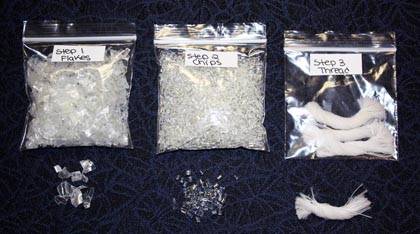Green Gowns
Duke Stores graduates sustainable efforts to commencement

Duke's graduating students will be dressed in black caps and gowns this month, but they'll be greener than ever.The change isn't in color, but rather the substance of the graduation garb. On May 15, students will wear apparel made of material produced from recycled plastic bottles. About 4,500 undergraduate and graduate students are expected to receive diplomas; this means as many as 100,000 plastic bottles could wind up on students rather than in a landfill."Everyone on campus, it seems, wants to do what they can to be more environmentally responsible," said Jim Wilkerson, the director of Duke University Stores who led the effort for making the change to sustainable caps and gowns. "This choice is representative of what the university is doing as a whole, so it was an easy decision."Purchased through Oak Hall Cap and Gown of Salem, Va., the academic regalia will be made of fabric spun from molten plastic pellets. Each cap and gown is made of about 20 used plastic bottles. The caps and gowns were also shipped in boxes made of recycled cardboard and in storage bags made from recycled plastic. Wilkerson said the new caps and gowns cost about $2 to $3 more than ones made from other materials, like polyester. Of that extra few dollars, Oak Hall contributes 25 cents for each gown sold to Duke's Students Taking an Active Role in Sustainability (STARS) committee, which provides funding to sustainability related projects at Duke."These gowns will help our graduates literally `walk the walk' for sustainability and, hopefully, encourage them to think about ways they can address environmental issues in their lives beyond Duke," said Tavey McDaniel Capps, director of Sustainable Duke.The move to sell "green" caps and gowns isn't the only sustainable aspect of Duke Stores. In addition to selling eco-friendly office and school supplies, recycling paper and plastic materials and saving and reusing boxes and packing supplies, Duke Stores also has helped the university make some big changes:
- During the state's worst drought in 2007, Duke Stores' administrators took the lead in purchasing 189 high-efficiency laundry machines for residence halls that save almost 3 million gallons of water per year compared to normal washers and also cut energy costs by about $75,000.
- The textbook buyback program has purchased about 51,000 books in the last four buyback sessions, diverting about 13,000 tons of books from landfills.
- The Terrace Shop in the Doris Duke Center collects rainwater to water plants at the Sarah P. Duke Gardens.
"In this era of environmental stewardship, all these things just feel like the right thing to do," said Tom Craig, merchandise manager for Duke Stores. "Natural resources won't be around forever, so we want to be committed to reducing and reusing materials to make sure we're helping Duke be as green as possible."
Read More